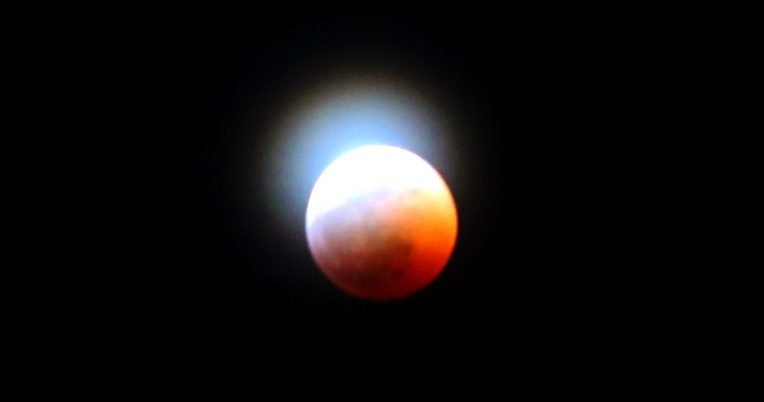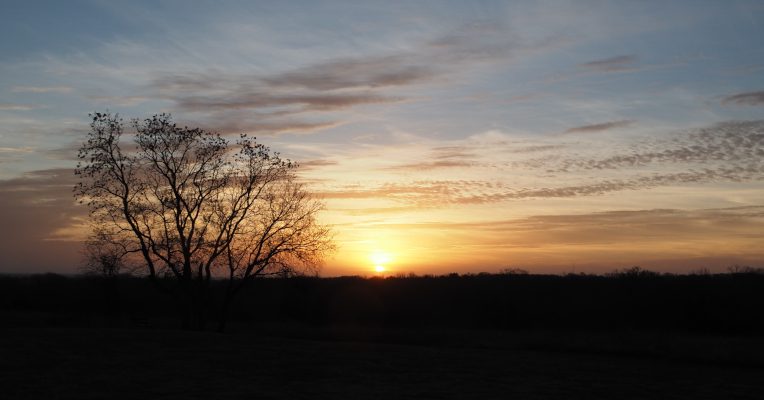A half hour into Sunday night’s lunar eclipse, famed physicist and astronomer Neil deGrasse Tyson tried to throw cold water on the experience.
Lunar eclipses are so un-spectacular that if nobody told you what was happening to the Moon you’d probably not notice at all.
Just sayin’.
I respect Tyson’s scientific work. I appreciate how he’s become the public face of astronomy since the death of Carl Sagan. He did a good job hosting the updated Cosmos TV show in 2014.
Tyson insists he’s an agnostic, not an atheist. I’ll take him at his word, but based on what he’s said, I’d put him at a 6 on Richard Dawkins’ 7-point spectrum of theistic probability (I’m a 2 – on some days I’m a 1). He’s clearly a materialist. And while those are certainly valid positions (even though I obviously don’t agree with them) they’re no excuse for what else he is:
A disenchanted killjoy.
This is hardly the first time he’s done this. Here’s a link to a list of quotes that could best be titled “shut up and let people enjoy things!” When it comes to ordinary people relating to science, he just doesn’t get it.

You don’t have to be a Pagan to appreciate Nature
In the 2017 book The Myth of Disenchantment: Magic, Modernity and the Birth of the Human Sciences, Professor Jason Josephson-Storm showed how the myth of disenchantment is a lie. Each generation laments the disappearance of magic and spirits, while at the same time having the kind of magical and spiritual experiences the next generation will look back on with envy.
Yet some individuals are disenchanted. They believe there is nothing beyond matter and the interactions of matter – and they believe that with all the zeal of fundamentalists who believe everybody but their own flavor of Christians are going to hell. And while they rarely cause the kind of harm that fundamentalists cause (atheists aren’t known for banning and burning books), they’re far more smug and dismissive in their beliefs. They think they’re intelligent and educated, while anyone who doesn’t rationalize away their spiritual experiences is naïve or deluded or engaging in wish fulfillment.
It doesn’t have to be that way.
Even if you genuinely believe atheism and materialism are the best way to understand Life and the Universe, that’s no reason to ignore the beauty and wonder in Nature.
You don’t have to be a Pagan appreciate the beauty of a sunset. You don’t have to be an animist to enjoy watching animals in the wild. You don’t have to be a polytheist – or any kind of theist – to understand the significance of the changing seasons, and to find joy in celebrating the Solstices and Equinoxes.
Beauty doesn’t require rarity
On one level, Tyson is right. If nobody told you there was a lunar eclipse you might not notice it. Lunar eclipses happen in the sky at night. Most of us are indoors, and if we aren’t we may have no reason to look up into the sky. Even if you did, the Moon might be blocked by clouds – as it was for me this time, sadly.
But if you happened to notice it, what an experience it would be.
The eclipsed Moon doesn’t disappear. It turns dark red, a process that took about an hour this time. It stayed totally eclipsed for about an hour and twenty minutes, and then the bright full Moon began to reappear.
Watching a lunar eclipse is like watching a full month’s cycle of the phases of the Moon, all in about three hours.
Unlike solar eclipses, lunar eclipses aren’t particularly rare. On average, any given place will see a full lunar eclipse every two and a half years. But rarity isn’t everything. The Sun sets every evening and any one of them can be a spectacular experience, if we’ll stop and watch it.
No supernatural beliefs required.

Knowing science makes spirituality better
Science need not dampen our enthusiasm for the spiritual aspects of Nature. Quite the contrary – for me it increases it. I look up in the night sky and I realize the light I’m seeing left some of the stars a few years ago. If I can find the Andromeda Galaxy, I’m seeing light that left 2.5 million years ago – about the same time the earliest members of the genus Homo were walking the Earth.
The universe is so very large and so very old. We are so very small, so very new – and so very brief. And yet here we are, contemplating it all. How can that not overwhelm you with wonder and awe? Knowing the science of it just makes it that much better.
Perhaps Tyson is simply jaded. He’s participated in advanced astronomical research and has access to some of the best scientific facilities in the world. He’s seen things most of us will never know exist, and he understands them at a level most of us simply can’t fathom. I’m sure to him a lunar eclipse is quite pedestrian. If he’s unimpressed, that’s his business.
But let people enjoy things.
A memorable eclipse… for all the wrong reasons
I imagine I’ll always remember this particular lunar eclipse – and not because of Neil deGrasse Tyson being a killjoy.
I recently obtained a very long lens for one of my cameras. I bought it for wildlife photography, but it should also do well for sky shots, especially the Moon. Especially lunar eclipses. I had planned to put it on a tripod and experiment with various setting to try to get the clearest – and most interesting – Moon photos I could get.
It’s been hot and dry in North Texas lately – we’ve had several record highs. But Sunday evening was completely overcast. By the time the visible portion of the eclipse began, a small but strong storm moved into the area. Instead of setting up a tripod, I was pouring my weekly offerings in a 60 MPH wind and then making sure the trash cans were secure. I got no pictures at all.
We had thunder and lightning and high winds for several hours – loud enough and long enough I didn’t get much sleep Sunday night. And the storm knocked out the cable, which knocked out the internet, which meant that instead of working from home on Monday I had to go into the office.
At least we got some rain out of all that.
Let people enjoy things
Was this an example of how eclipses are traditionally considered inauspicious times? I don’t think so. A few people reported strange and unpleasant spiritual experiences around the eclipse, but unexpected storms are a fairly common thing in North Texas in the Spring. That this one happened during a lunar eclipse doesn’t appear to be relevant.
In order to accurately read omens in Nature, we have to understand what’s ordinary in Nature. Then when we encounter something extraordinary, we can begin a process of discernment to figure out what it means – if it means anything at all.
But natural phenomena need not be extraordinary to be beautiful and worth our time and effort to observe and enjoy. They don’t have to carry special messages to be meaningful, and to help us understand that we’re part of something bigger than ourselves. They don’t have to be super rare to be spectacular.
Nature is beautiful and powerful, life-giving and life-taking, and Nature is good. And spectacular. And meaningful.
If you’re so disenchanted you can’t see this, I feel sorry for you. If you’re so scientifically snobbish you can’t appreciate an ordinary-but-beautiful event, that’s on you.
Either way, let people enjoy things.


















